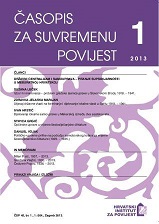Utjecaj državne vlasti na formiranje i djelovanje lokalne vlasti u Splitu 1918.-1941.
THE INFLUENCE OF THE STATE AUTHORITIES ON THE FORMATION AND ACTIVITY OF LOCAL AUTHORITIES IN SPLIT, 1918-1941
Author(s): Zdravka Jelaska MarijanSubject(s): History
Published by: Hrvatski institut za povijest
Keywords: Split; municipality; autonomous administration; elections; 1918-1941
Summary/Abstract: The influence of the central authorities on the local administrative apparatus in Split was especially strong during the entire interwar period, but it was expressed in a variety of ways and it did not always have the same force of impact. Prior to the December 1 unification in 1918, most of the members of the Split Municipal Council had been elected in 1911 or 1913. This council was re-established following the collapse of the Austrian regime, which took with it its appointed trustee. Nevertheless, this Council was expanded by co-optations, most likely following the example of the National Council of Serbs, Croats, and Slovenes, and it also selected a new mayor and executive whose appointment had no relationship to the results of the 1913 elections. Thus, the status quo established to head up the Split Municipal Council was not altered by the new government, and though this was to be a provisional solution, local elections were put off and it remained in effect for eight years, though the number of councillors was continually reduced. During the interwar period municipal elections were held only twice in Split, in 1926 and 1928. The municipal elections of 1926 were truncated due to the disqualification of the mandates of ten councillors. Instead of canceling the elections the authorities reduced the number of councillors, and to skew the local administration they even attempted to unlawfully influence the allotment of one of the mandates. This council was dissolved after two years. The council elected in 1928 and the municipal administration which it selected was the only municipal administration established upon the results of elections, but it was disbanded after only two months. With the proclamation of the 6th of January dictatorship, the practice of nominating the municipal council and administration was established. This process continued even after new legislation concerning municipal government was passed in 1934. Even though the electoral rules prescribed by the new law should have ensured more influence for the central authorities over municipal councils, these measures did not seem sufficient, thus elections on the basis of this law were never held, and central authorities continued the practice of appointing mayors and councillors. Nor did the establishment of the Croatian Banovina bring an improvement, as its authorities continued to appoint mayors and councillors.
Journal: Časopis za suvremenu povijest
- Issue Year: 45/2013
- Issue No: 1
- Page Range: 35-63
- Page Count: 29
- Language: Croatian

